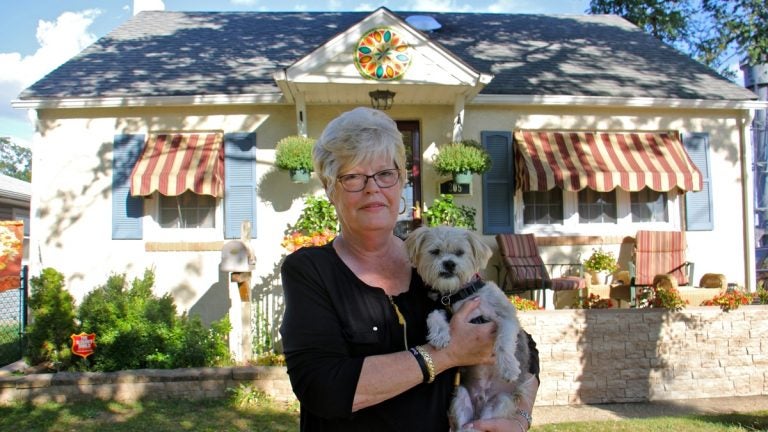Voting Block: What will N.J.’s next governor do about the decline in housing affordability?
Although taxes are a top issue in this year's race for governor, Republican Lt. Gov. Kim Guadagno and Democrat Phil Murphy housing affordability is getting little play.
Listen 0:00
Betty Paulsen, with Pepper, stands outside her home in Paulsboro, where she has seen more turn from owner-occupied to rentals. (Emma Lee/WHYY)
For 15 years, Betty Paulsen has owned a home with her husband on a quiet block in Paulsboro, a small, blue-collar, New Jersey town across the Delaware River from Philadelphia International Airport.
The biggest change she’s noticed in that time: Her homeowning neighbors are disappearing.
“They’ve passed [away] and moved on,” Paulsen said. “A lot of people, their houses have gone up for sale or they couldn’t sell them, so they have renters in them.”
In fact, more Americans are renting their homes now than at any point since 1965, according to a recent Pew analysis.
That trend is especially potent in New Jersey, where a high cost of living and ever-rising property taxes have dashed the hopes of many aspiring homeowners.
Although taxes are a top issue for both major party candidates in this year’s race for governor Republican Lt. Gov. Kim Guadagno and Democrat Phil Murphy housing affordability is getting little play in the public discourse, despite its long and troubled history in the Garden State.
Yet whoever takes the state’s highest office in January will have to face the issue.
(Un)affordable housing
New Jersey boasts household incomes about 30 percent higher than the national average.
But household prices in the Garden State are even higher, about 50 percent above average, which means even some residents who work full-time cannot afford to buy a home.
“This is one of the aftershocks, I think, of the Great Recession,” said Dr. James Hughes, a professor at Rutgers University’s Bloustein School. “Home ownership has lost some of its allure.”
Young buyers used to see homes as the “super piggy bank,” Hughes said, an investment that increased in value over years and even decades. But now fewer and fewer people can afford it.
That is pushing more residents to rent their homes across New Jersey, which presents another set of problems. The Garden State is among the least affordable states for renters in the country, according to a 2015 study by the National Low Income Housing Coalition.
In addition to high rents, it can be difficult for many people to find accessible apartments or rental homes in a state known for its suburban sprawl.
For decades cities and towns across New Jersey used exclusionary zoning practices to keep out the types of housing that would typically accommodate renters. For example, if a town were only zoned for single-family homes, only single-family homes would be built. Poorer residents who could only afford to rent a small apartment, for example, would be priced out of living in that town altogether.
Eventually that practice was slapped down by the state Supreme Court in two rulings in 1975 and 1983, known as the Mt. Laurel decisions, which required municipalities across New Jersey to zone for their “fair share” of affordable housing.
“Lots of municipalities love to have malls and office parks,” said Kevin Walsh, director of the nonprofit Fair Share Housing Center, “but they don’t necessarily provide the kinds of zoning that’s needed to develop starter homes and apartments for lower income households who work in those malls and office parks.”
Enforcement of affordable housing rules has been lax under Gov. Chris Christie’s administration.
The Council on Affordable Housing, which was tasked with developing zoning obligations for municipalities across the state, barely functioned. In 2015 the state Supreme Court ruled that the agency was “moribund” and put the task of determining affordable housing obligations in the hands of the state’s trial courts.
While many towns are still fighting Walsh and Fair Share Housing Center on their obligations, others have now reached court settlements specifying how much affordable housing they have to zone for and how many properties they have to rehab as part of the agreement.
Walsh says many of the public officials who resisted affordable housing in the past have come to realize just how many residents are truly struggling to meet their housing costs.
“In one instance, we had a mayor that fought for years and years and years. And then, when new affordable homes were built in the mayor’s town, the mayor asked if his secretary could apply.”
What can a governor do?
Although it is the responsibility of municipalities to zone for their “fair share” of affordable housing, experts said the New Jersey governor has the power to take actions that would make the state more affordable for new and existing residents, such as enforcing the Mt. Laurel decisions and combatting the foreclosure crisis.
Both major party gubernatorial candidates, responding to three questions submitted to their campaigns by WHYY, vowed to cut property taxes to make it easier for people to buy houses. Read the questions, and full answers below.
Guadagno, the Republican nominee, said she would achieve this through her “circuit breaker” plan, which would lower the tax burden on residents in part by cutting the costs of state government and ensure taxpayers don’t spend more than five percent of their household income on school taxes. If she doesn’t cut property taxes in her first term, Guadagno vowed, she would not run for a second.
Although she opposes exclusionary zoning practices, Guadagno called the current state of affordable housing requirements “unworkable,” and vowed to create a new plan for development across the state. “What we do not need is more sprawl development with pockets of affordable housing scattered around the state with no jobs nearby or mass transportation to get anywhere,” she wrote.
Murphy, her Democratic opponent, said he plans to lower property taxes by setting aside enough money to pay for the state’s school funding formula. The former U.S. ambassador also plans to expand the Neighborhood Revitalization Tax Credit and use mortgage settlement money to rehab distressed neighborhoods. On affordable housing, Murphy said he understands “that zoning for affordable housing is a constitutional requirement and [I] will work with municipalities to help them achieve their obligations.”
But even for people who can afford to buy homes, many are not choosing small, blue-collar towns like Paulsboro. “Millennials’ parents, that is Baby Boomers, couldn’t wait to get out of New Jersey’s cities and move to the leafy suburbs,” Hughes, the Rutgers professor, said. “In contrast, Millennials can’t wait to get out of the leafy suburbs and move to 24/7 active environments.”
While some prospective buyers are passing over Paulsboro and homeowners are moving away, others are being foreclosed upon, facing tight economic pressures. That’s leading to neighborhood blight.
“I mean, you can tell,” said Paulsen, of the homes that are rented or abandoned. “You’ll see a sign in a window that the property’s up for sale or whatever. They don’t keep their properties as nice as a homeowner. They don’t have that investment.”
Paulsboro officials are actively trying to turn around the local housing market. The sole code enforcement official is issuing more violations. And the two-square-mile town now has a list of abandoned properties on its website, hoping to take legal control of the homes and flip them.
But Mayor Gary Stevenson said that what Paulsboro really needs to make a change in the city is money, and that small towns like his are often forgotten by Trenton politicians.
“They keep shifting a lot of money to your Camdens and your Newarks. And they keep forgetting about the little towns,” Stevenson said, “like we don’t make up enough.”
Stevenson hopes New Jersey’s next governor finds solutions to the state’s housing ills that help all 565 of its cities and towns.
—
Below are the questions asked by WHYY, and the candidates answers, unedited.
More Americans are renting homes now than at any point since 1965. Would it be a priority for your administration to help people buy homes? If so, what would you do?
Guadagno:
“Absolutely. New Jersey used to be an affordable place to live when I chose to raise my family here with my husband, Mike. However, today, New Jersey has the highest foreclosure rate and the highest property taxes in the country.
“The Asbury Park Press estimated the average New Jersey family spends 9% of their household income on their property taxes. That’s too much.
“Because property taxes continue to climb with no end in sight, many people are deterred from buying homes because they can’t afford their property tax bills which have become like a second mortgage. It’s forcing families to lose their homes. It’s stopping millennials from buying homes. It’s causing seniors to retire in other states.
“While my opponent would make it more expensive to live in New Jersey by raising taxes, I’m running for governor with one main goal in mind: I will lower property taxes during my first term or not run for a second. My plan is simple, and it is designed to help middle class families, not millionaires. New Jerseyans shouldn’t have to pay more than 5 percent of their household income toward school taxes, the main driver of our state’s high property taxes. If school taxes get too high, you stop paying. A credit would appear directly on your property tax bill and actually lower the amount you pay out of pocket if your school taxes exceed 5 percent of your household income. This will result in savings of up to $3,000 a year on your property taxes depending on where you live and your income.
“It might not seem like a lot of money to a Goldman Sachs millionaire like Phil Murphy, but that’s real money to middle class families in New Jersey. And it will give families and seniors certainty that they’ll be able to afford to live here and stay in New Jersey.”
Murphy:
“Sadly, homeownership is falling farther and farther out of the reach of many New Jerseyans. Given our state’s density, we need new housing supply, which is why I support the expansion of programs like the Neighborhood Revitalization Tax Credit, where every public dollar invested has returned many times that in private dollars. And I also recognize that the high cost of property taxes is deterring many people from buying homes. I will reduce property taxes by fully funding the school formula and relieving fiscal pressures on municipalities, expanding property tax relief for seniors, and incentivizing shared services.”
Due to the foreclosure crisis, more towns are faced with the problem of neighborhood blight. When absentee landlords and banks don’t take care of foreclosed homes, they fall into disrepair. How will you help cities and towns reduce blight?
Guadagno:
“NJ has the highest foreclosure rate in the country because of what Phil Murphy and his buddies on Wall Street did to our economy. He was on the management committee of Goldman Sachs when they were selling subprime and near subprime securities that later tanked. And now he wants to be governor and create a state bank of New Jersey? Trusting a Goldman Sachs millionaire like Phil Murphy with our economy and our taxpayer money is the definition of insanity. He won’t solve the problem, he’ll make it worse.
“In addition to lowering property taxes, I will work to expand economic opportunity across the state, because the more economic activity New Jersey attracts, the lower foreclosure rates will be. Additionally, I will work with local governments to encourage the sale, smart redevelopment or rehabilitation of vacant property. For instance, the state can assist with regulatory matters and encourage municipalities to offer incentives to redevelop blighted neighborhoods and properties. New Jersey can also encourage lenders to rent out vacant properties back to their original owners.
“Additionally, I think we should create a ‘Main Street Solutions’ Fund by integrating many of the state’s existing grant and incentive programs to tackle the problem of blight. We can direct efforts to revitalizing main street corridors, the ultimate sign of a town’s economic health and vitality, by attracting businesses and development.”
Murphy:
“I will tackle the problem of foreclosures head on, as it is unacceptable that New Jersey has the highest foreclosure rate in the nation. I understand that we have to make it easier for people to stay in their homes, and I have proposed that we use Wall Street mortgage settlement money to purchase vacant foreclosed properties and repurpose them as affordable housing. There is $9.6 billion of unallocated funds for consumer relief resulting from the Wall Street settlements, and because New Jersey has 9 percent of the settlements, it should receive 9 percent of these funds — roughly $868 million. This is a substantial pot of money that could be used to repurpose foreclosed homes and reduce blight.”
Municipalities across the state are grappling with their affordable housing obligations under the Mount Laurel decisions. Some have decided how many affordable units to zone for while others are fighting the issue in court. Do you believe cities and towns have a responsibility to zone for affordable housing? How would your administration enforce those obligations?
Guadagno:
“Providing affordable housing has been one of the more vexing problems that has faced New Jersey for decades. While I do not support using exclusionary housing policies to keep out lower income people, I also believe the current state of our affordable housing laws passed by the Legislature and interpreted by the courts is unworkable. Clearly, the existing paradigm has not worked for those who need affordable housing or for municipalities. It has certainly not worked for New Jersey taxpayers.
“I am a strong supporter of a re-invigorated State Plan that maps the areas where we should develop and should not develop. I strongly support redevelopment of our urban cities, transportation hubs, and older suburban cores. If we can attract jobs to these areas we will have a much easier time providing affordable housing in proximity to where the jobs are and where mass transportation can be provided. What we do not need is more sprawl development with pockets of affordable housing scattered around the State with no jobs nearby or mass transportation to get anywhere.”
Murphy:
“I understand that zoning for affordable housing is a constitutional requirement and will work with municipalities to help them achieve their obligations. I am closely monitoring the ongoing affordable housing litigation in the courts. I have observed that a number of cases are settling, which is a positive development allowing construction of affordable housing units to proceed. Going forward, I am open to all ideas on how to make sure that affordable housing obligations are being met, and will ensure that all sides have a voice at the table.”
WHYY is your source for fact-based, in-depth journalism and information. As a nonprofit organization, we rely on financial support from readers like you. Please give today.




